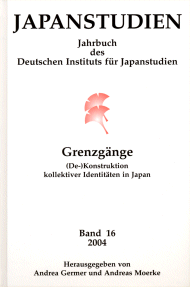
Details
2004, ISBN 3-89129-379-8, € 50,-, iudicium Verlag, Munich, 337 p., hardcover [Order]Authors
Moerke, Andreas
Japanstudien 16
Grenzgänge – (De-)Konstruktion kollektiver Identitäten in Japan

This year’s DIJ Yearbook, Japanstudien 16, has the title “Grenzgänge – (De-)Konstruktion kollektiver Identitäten in Japan” [Crossing Borders – (De-)Construction of Collective Identities in Japan], and focuses on discourses on difference, homogeneity, and divergence. The studies comprising this book encompass theoretical, analytical, and descriptive contributions. They will, it is hoped, aid in a reconsideration of the all too familiar topos of Japanese ‘group-orientation’, the central argument within the debates on the cultural uniqueness of Japan (Nihonjinron). The essays presented in this volume examine the inhomogeneity of social, ethnic, gender and sexual groupings in Japan, and, by highlighting the occasionally contradictory divisions and intersections, critically discuss the discursive construction of collective identities.
Content
Re-made in Japan: Nikkeijin Disruptions of Japan's Ethno-Spatial Boundaries
p. 91-117
"We are all 'Residents of Japan"': The Construction of Common Identity and the Success of the Anti-fingerprinting Movement
p. 145-165
Chiiki tsūka - Eine Währung für die Community? (Chiiki tsūka as a community currency?)
p. 201-236
Konstruktivismus, Wahrnehmung und Gedächtnis: Plädoyer für einen konstruktivistischen Landschaftsdiskurs
p. 239-256
Die Konstruktion der träumenden Frau oder weshalb es in Japan „nur" Traumdichterinnen gibt
p. 257-278
„Die beste und schönste Sprache der Welt". Shiga Naoyas Vorschlag zur Ersetzung des Japanischen durch das Französische
p. 279-305
Brochlos, Astrid: Kannbon no kiso = Kanbun: Grundlagen der klassischen sino-japanischen Schriftsprache
p. 309-318
Schulz, Evelyn: Stadt-Diskurse in den „Aufzeichrnunggen über das Prosperieren von Tōkyō" (Tokyo hanjō ki). Eine Gattung der topografi¬schem Literatur Japans und ihre Bilder von Tōkyō (1832-1958)
p. 319-324
Trinh, Khanh: Darstellung realer Orte. Die „wahren Landschaften" des „malenden Reporters" Tani Bunchō (1763-1840)
p. 325-328
Murakami Ryū: Kibō no kuni no ekusodasu. [Der Auszug ins Gelobte Land.] (The exodus to the land of hope)
p. 329-332
Grenzgänge - Zur (De-)Konstruktion von sozialen Gruppen und kollektiven Identitäten in Japan. Eine Hinleitung
p.11-24
Alien Attack? The Construction of Foreign Criminality in Contemporary Japan
p. 27-57
A Touchstone for Transnational Feminism: Discourses on the Comfort Women in 1990s Japan
p. 59-90
Vorwort
p. 9-10